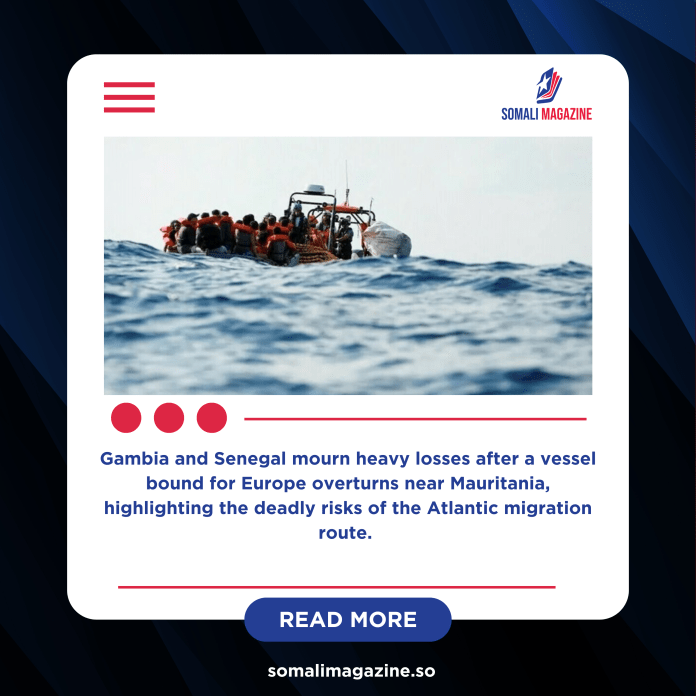Facebook Twitter (X) Instagram Somali Magazine - People's Magazine
A devastating tragedy has struck off the coast of West Africa after a migrant boat carrying around 150 people capsized in the Atlantic Ocean, leaving at least 70 people dead and many more feared lost at sea.
According to a statement released by Gambia’s Ministry of Foreign Affairs on Friday, the vessel is believed to have departed from Gambia and was carrying mostly Gambian and Senegalese nationals. The boat was headed toward Europe, part of the increasingly dangerous migration route from West Africa to Spain’s Canary Islands.
The incident occurred early Wednesday off the coast of Mauritania, when the vessel overturned. Mauritanian authorities, along with local residents, began rescue and recovery operations immediately. By Thursday evening, officials had confirmed the recovery of 70 bodies from the ocean. Sixteen survivors were pulled from the wreckage and brought to safety, though many remain in critical condition.
Witnesses and survivors have reported that more than 100 people may have drowned in the accident, which would make it one of the deadliest maritime disasters in recent years along this route. Gambia’s foreign ministry added that another 30 individuals are still missing and presumed dead.
The Dangerous Atlantic Route
The accident highlights the growing risks associated with the Atlantic migration route, one of the most perilous paths taken by migrants attempting to reach Europe. This sea journey, which stretches from the coasts of Gambia, Senegal, and other West African nations to the Canary Islands, is notorious for its length, unpredictable weather, and overcrowded vessels.
Last year alone, more than 46,000 migrants—mainly from sub-Saharan Africa—arrived at the Canary Islands. This marked a record number, reflecting both the desperation and determination of people leaving their home countries in search of a better future. However, the same year also saw over 10,000 deaths recorded along the route, according to the Spanish rights organization Caminando Fronteras. This represented a 58% increase compared to 2023, making the Atlantic corridor one of the deadliest migration routes in the world.
Human rights organizations and aid agencies have repeatedly warned about the dangers of these crossings. Many of the boats used are small wooden fishing vessels, not designed for long sea journeys. They are often overloaded with people and lack basic safety equipment such as life jackets, food, or sufficient fuel. Migrants also face threats from storms, engine failures, and dehydration during the long voyage.
A Nation in Mourning
In the wake of the disaster, Gambia’s Ministry of Foreign Affairs issued a public plea to its citizens. The ministry urged Gambians to avoid undertaking such dangerous journeys, stressing that “these perilous attempts continue to claim the lives of many.” Families across Gambia and Senegal are now mourning loved ones, while others wait anxiously for news about missing relatives.
Local communities in Mauritania have also been directly impacted, as residents assisted authorities in recovering bodies and rescuing survivors. The incident has cast a heavy shadow across the region, once again drawing attention to the human cost of irregular migration.
Why People Risk the Journey
Despite the known dangers, many young Africans continue to take the Atlantic route. High unemployment, political instability, and limited opportunities drive thousands to leave their home countries every year. For many, reaching Europe represents hope for a better future, education, and the chance to support families back home.
However, the increasing death toll raises urgent questions for both African governments and European policymakers. While countries such as Gambia continue to warn their citizens, experts argue that addressing the root causes of migration—such as poverty, lack of jobs, and political challenges—must be at the center of long-term solutions.
A Humanitarian Crisis
This latest tragedy is a painful reminder of the risks that migrants face when forced to choose between dangerous journeys and uncertain futures at home. As search efforts continue off the coast of Mauritania, the exact death toll may rise even further.
For now, the waters of the Atlantic have claimed dozens of lives, leaving behind grieving families and renewed calls for safer, more humane alternatives to irregular migration.

